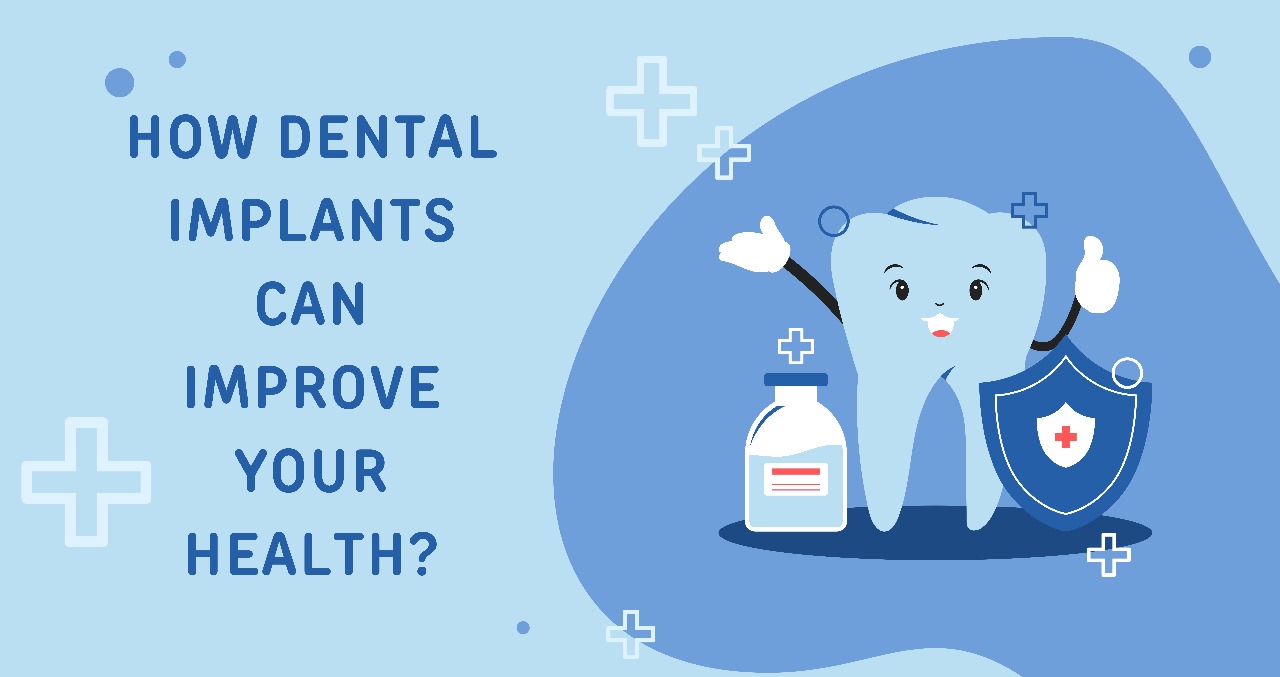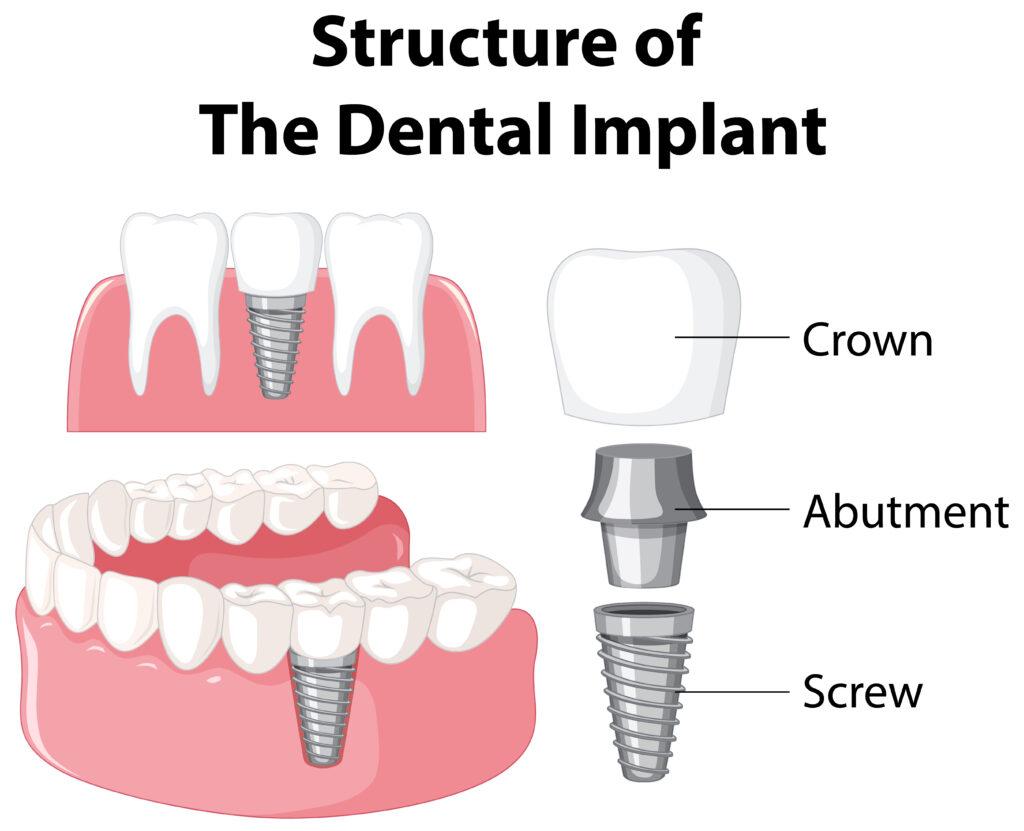
When we lose a tooth, it affects not just our smile but even our health feels the impact. For example, it may cause bacteria to accumulate under the gum line or surrounding teeth to shift. Furthermore, our confidence takes a beating since we feel others may notice the gap in our teeth when we speak or smile. Fortunately, a dental implant is an excellent solution to replace missing teeth that is safe and long-lasting. What’s more, it positively impacts your overall health. Benefits of dental implants for health
If all these come as a surprise to you, then scroll on as you are about to discover more about the benefits of dental implants and how dental implants work.
Understanding Dental Implants:Benefits of dental implants for health
Dental implants are a modern solution for replacing missing teeth, offering a natural look and feel and a better option if you are choosing between dental implants vs. dentures. The procedure involves inserting metal, screw-like posts into your jawbone, which act as strong, stable roots for artificial teeth. Since the titanium in the implants fuses with the bone, implants offer long-lasting stability without the risk of slipping or bone damage, unlike traditional dentures or bridges. Plus, they don’t decay like natural teeth.
Dental implants could be a great option for you if you’re missing one or more teeth, have a fully developed jawbone and enough bone to secure the implants, or are open to a bone graft. It’s also important to have good oral health, no conditions that affect bone healing, and a willingness to commit time to the process. If you prefer a long-term solution over dentures, implants might be right for you.

Long-Term Health Benefits of Dental Implants
In addition to improving aesthetics, the long-term health benefits of dental implants positively impact your well-being and quality of life. Let us examine them in detail:
1.Prevents Bone Loss
Dental implants help prevent bone loss that usually follows tooth loss. When you lose a tooth, your jawbone no longer receives the pressure it needs, causing your body to break down and absorb the bone. Studies show that some percent of the alveolar ridge, the part of your jaw that holds the tooth, is lost within the first six months. Implants, however, slow down this process by preserving bone and preventing resorption.
2.Keeps Adjacent Teeth Stable
When a tooth is missing, nearby teeth may shift towards the gap, impacting your chewing ability and bite, creating a common problem known as malocclusion. Dental implants prevent this by filling the space, keeping your other teeth stable, and reducing the risk of future complications like jaw pain or wear and tear of teeth due to the misalignment.
3.Enhanced chewing for better health
Dental implants for improved chewing are another reason why people prefer them over dentures. Implants greatly enhance chewing ability by functioning like natural teeth, providing the strength and stability needed to enjoy a wide range of foods. Unlike dentures, implants don’t shift or cause discomfort while eating, allowing patients to comfortably eat crunchy or chewy foods. This improved bite force also aids digestion, as food is broken down more efficiently. With dental implants, eating becomes more enjoyable and supports overall health by promoting better nutrition and digestion.
4.Creates a Bacteria-Free Environment
Dental implants protect against harmful bacteria by helping prevent tooth decay. Since they prevent bacteria from entering the root, they lower the risk of gum diseases like gingivitis and severe conditions like periodontitis. Implants create a healthier, more resistant environment for your teeth and gums.
5.Boosts Mental Well-Being
The emotional benefits of dental implants are another strong reason for their popularity. Losing a tooth can harm self-esteem and lead to social withdrawal. Implants restore not only your smile but also your confidence, allowing you to speak, smile, and eat comfortably in public again. They even prevent bone loss, which helps maintain the natural shape of your face, supporting your overall well-being and quality of life.

6.Speech improvement
Dental implants for speech improvement are another crucial benefit to consider. They significantly improve speech by restoring missing teeth, which play a crucial role in pronunciation and articulation. When teeth are missing, it can affect how clearly and confidently you speak. Implants provide stability, allowing for proper tongue positioning and airflow, which is essential for clear speech. While some may experience a brief adjustment period, most patients notice improved pronunciation and overall communication once they adapt to the new dental structure.
Other Key Benefits of Dental Implants
Besides the long-term health benefits of dental implants, they offer other perks that make them a preferred choice for filling the gap left by missing teeth:
-
Aesthetics
Dental implants look and feel like natural teeth, allowing you to enjoy your favorite foods without worry. You can confidently bite into apples or steaks without the shifting often associated with dentures.
-
Easy Maintenance
Caring for dental implants is as simple as maintaining natural teeth—brush twice daily, floss regularly, and visit your dentist for routine check-ups. No special cleaning techniques or tools are required.
-
Longevity and Durability
Made from strong materials like titanium, dental implants can last for decades or even a lifetime with proper care. Their secure fit also helps prevent bone loss and maintain oral health in the long term.
Dental implants vs. Dentures
The following comparison will help you decide between dental implants vs. dentures.
Types of Treatment:
- Implants: A titanium screw fixed into the jawbone with a crown placed on top.
- Dentures: Removable frameworks (full or partial) that carry false teeth.
Look, Feel, and Functionality:
- Implants: Look and function like natural teeth, offering stability and no impact on speech.
- Dentures: May require an adjustment period and can shift while eating or speaking.
Treatment Time and Care:
- Implants: Involves two surgical procedures and may require bone grafting, taking several months.
- Dentures: A quicker process, usually fitted in one or two appointments.
Durability:
- Implants: If well taken care of, they can last a lifetime.
- Dentures: Usually require replacement every 5-8 years.
Aftercare:
- Implants: Care for them like your natural teeth with regular checkups with a dentist.
- Dentures: Need cleaning to avoid irritation and ensure they are comfortable.
Costs:
- Implants: Costlier because of the design and the materials used
- Dentures: Cheaper in the beginning but require replacement from time to time.
Suitability:
- Implants: Not recommended for smokers or those with chronic illnesses that are not well managed.
- Dentures: Good for most people, with some exceptions if gum health issues are present.
Maintaining Dental Implants, Benefits of dental implants for health
Having understood the benefits of dental implants, let us proceed to the topic of how to care for them. When done appropriately and under the direction of your dentist, maintaining dental implants for health will be easy, and they can last for several years in the best condition possible.
- Use a Soft Nylon Brush: When you have dental implants, it is recommended that you change to a soft nylon toothbrush. Such bristles are soft on your implants, and they will clean them well without causing any scratches.

- Avoid Abrasive Products: You should select gentle products for cleaning your mouth, including toothpaste and mouthwash. Avoid anything that can irritate your mouth, like mint or cinnamon.
- Floss Daily: It is important to floss around your implants because plaque can form around them. Dentists recommend using floss made especially for implants to avoid any sort of dental issues.
- Avoid Sticky/Hard Foods: Crunchy or chewy foods are not good for your implants and the teeth that are opposite them. You should not consume foods such as ice, caramel, dried fruits, and hard candies to prevent damaging your implant.
- Use a Mouth Rinse: You may want to use an antimicrobial mouth rinse to reduce the amount of bacteria in your mouth. These can help you keep your implants clean and the surrounding area free from infections for an overall healthy mouth.
- Follow Aftercare Instructions: Try to follow the implant aftercare guidelines given to you by your dentist after the implant surgery. Following them decreases early implant failure and is crucial for a smooth recovery.
Conclusion
Dental implants can benefit you in many ways that will improve your quality of life. It is quite possible that you will be surprised by the number of health benefits of dental implants, including the ability to chew food properly and the general improvement in your dental health. We hope this information will help you make the right decision if you have been hesitating to get dental implants.
Just remember, choosing a trusted dentist like Gnathos Dental with excellent dental implants success rates is crucial for a positive outcome. With their years of experience, the latest technology, and ADA-approved materials, you’ll be in good hands. Moreover, by following their aftercare instructions, you ensure your new implants last for years to come. So, why wait? Take the next step towards a healthier, happier smile!
FAQS
1.Do dental implants last several years? Benefits of dental implants for health
Dental implants are not susceptible to decay like natural teeth. Their average lifespan is around 20 years and sometimes even longer. However, maintaining healthy gums through good oral hygiene and professional cleanings with the help of your dentist is crucial for the long-term success of your implants.
2.Can I get metal-free implants? Benefits of dental implants for health|
Currently, there are no completely “metal-free” dental implants available, as most materials contain some metal ions. Dental implants are typically made from titanium alloy, which is highly biocompatible, and titanium allergies are very rare.
3.Are dental implants removable like dentures?
No, dental implants are not removable like dentures, as they are securely anchored in the jawbone, providing a stable and permanent solution that closely mimics the function of natural teeth
